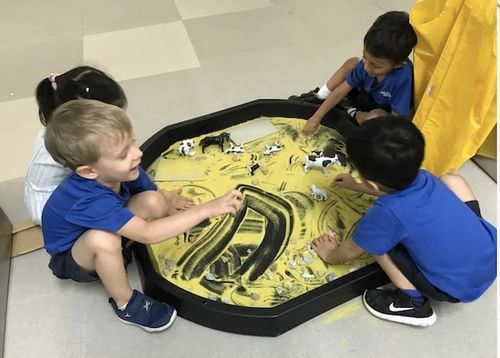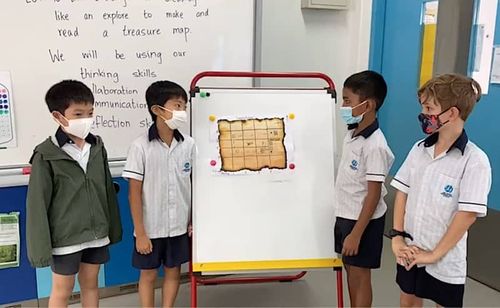Early childhood education has come a long way since its inception when it was primarily geared toward spoon-feeding information to young children. Leaders in early childhood education now recognise that children in kindergarten are naturally curious and capable of directing much of their own learning. Increasingly, nursery and preschool educators have realised the importance of play. At One World International School, Nanyang play is at the core of our early years curriculum and takes many forms. One of the most important of these is sensory play because it engages a child’s senses (taste, touch, smell, sight and hearing) and has a tremendously positive impact on brain development. Here’s what play is all about and how we incorporate it into our nursery and kindergarten curriculum to support all aspects of your child’s development.
The Different Stages of Play
- Unoccupied. In this phase, infants and toddlers move around simply because they enjoy it.
- Solitary. Children play by themselves, with seemingly no interest in or awareness of what the adults or children around them are doing.
- Onlooker. Children are conscious of what others are doing. But at this stage, they only observe, without trying to join others’ activities.
- Parallel. This is the precursor to playing with others. Children play alongside (but separate from) their peers.
- Associative Play. (About age 3). While toddlers play with other children, their play doesn’t have much of a purpose yet.
- Cooperative. Children play together with a common goal in mind.

Types of play
As children grow older, they love exploring different types of play and benefit from the following:
- Physical. Physical activity, whether it’s dancing, riding bikes, or engaging in sports, gives children an outlet for their energy and emotions while triggering the release of “feel-good” hormones.
- Imaginative. In imaginative play (also called pretend or dramatic play), children take on new roles, such as that of a parent, king, chef or teacher.
- Sensory. Sensory play for children is especially beneficial because engaging their senses allows them to live in the present and stay focussed.
- Inventive. With this form of play, children tap into their creative side by sculpting with clay, improvising songs or dances and expressing their emotions through drawing or painting.
- Outdoor. What sets outdoor play apart from other kinds of play is that it enables children to connect with nature.
- Play with Miniatures. Playing with miniature animals, people and other scaled-down objects enables children to participate in pretend play, making up their own stories or imitating activities they see adults and siblings engaging in.
Sensory Play and Multisensory Experiences
The Early Childhood classroom can provide the ideal backdrop for sensory play. Using art supplies to create pictures of their family, “measuring” containers of sand, or pushing toy tug boats through a lake of water beads are just a few of the many ways children can use their senses to connect with the world around them.
Opportunities for sensory play aren’t limited to the preschool classroom. You can provide your child with similar experiences at home, too. A sink full of coloured water and shells, pebbles in the garden area, or a pan of dry beans allows children to explore while cultivating their creativity and building new concepts.

What does Multisensory Learning Mean and Why Is It Important?
Multisensory learning is possible with any activity that allows children to use at least two of their senses. For example, having our preschool students at OWIS Nanyang, write their names in coloured sand involves touch and sight. Here are some other examples of multisensory play.
- Using clay to form letters and spell words. Children can also trace patterns in the clay with a pencil to sharpen their fine motor skills.
- Counting (and eating) nuts and raisins to practise addition and subtraction
- Crafting with leaves, herbs and other objects found in nature
Sensory play encourages social interaction and builds language, motor and problem-solving skills. Between ages three months and five years, children are developing gross motor skills — namely, coordination, balance, physical strength, reaction time and body awareness. During these formative years especially, the importance of play shouldn’t be minimised.
Multisensory Experiences at OWIS
Early learners have an abundance of multisensory learning experiences at OWIS Nanyang. Our multisensory activities encourage children to experiment and take risks. They learn cause and effect, communication, language and literacy skills. Play also allows for counting, measuring and sorting. When our youngest learners participate in multisensory play, the process is more important than the end result. Read on to discover what multisensory play looks like in our EC programme.
Teachers set up tables and tubs with a variety of materials so children can choose how they want to engage with the activity. Many activities involve “messy” play, which fosters curiosity and investigation. Students and teachers agree on some ground rules beforehand, such as not throwing objects out of the tubs and making sure everyone helps clean up afterwards. Teachers may assign a monitor to make sure children are abiding by the agreement. Another important role of the teacher is to model appropriate behaviour to maintain order in the classroom while giving children the freedom to explore. Possibilities for learning and creativity are practically limitless.

Early Childhood 1
Nursery students work with various herbs and vegetables — sliced carrots, lemongrass and sweet potatoes — in our “herb soup” tub. Picking up small objects improves their fine motor skills. Pouring and scooping help children observe different container sizes. In another activity, learners use scissors to cut paper, promoting dexterity and eye-hand coordination.
Early Childhood 2
Two students experiment with foam and sand. They stretch their vocabularies as they describe what they’re doing or make up an imaginative story related to their play. Nearby, another pair of children participate in small-world play. Working in pairs or small groups teaches children about teamwork and conflict resolution.
Early Childhood 3
Students wash baby dolls in soapy tubs, pretending to take on the role of adult caregivers. Other students play with kernels and miniature animals in small-world play. These activities invite children to create a world all their own, giving them a sense of control, which, in turn, builds confidence. At another table, students use pipe connectors and other materials to build different structures. This activity fosters fine motor skill development, creativity and communication. Children also learn about spatial relationships and can begin to develop an understanding of gravity.
At OWIS Nanyang, multisensory learning is related to the units of inquiry our EC students are exploring in the classroom. Learners discover how to build on what they already know by making connections between concepts and ideas. Play sparks children’s natural curiosity, so they are motivated to take ownership of their learning.
To learn more about how our play-based preschools in Singapore can enrich your child’s learning experience, schedule a school tour.
Please note: All the images in this blog were taken in pre-Covid times.
(This blog was originally written in collaboration with Ms Nurul Rozali, former Early Childhood Teacher, OWIS Nanyang.)














